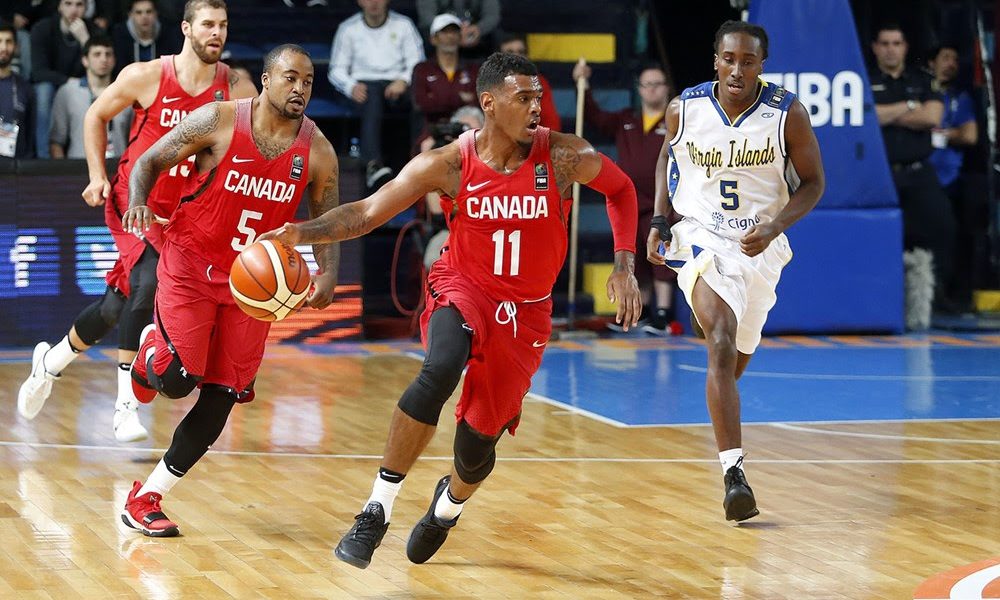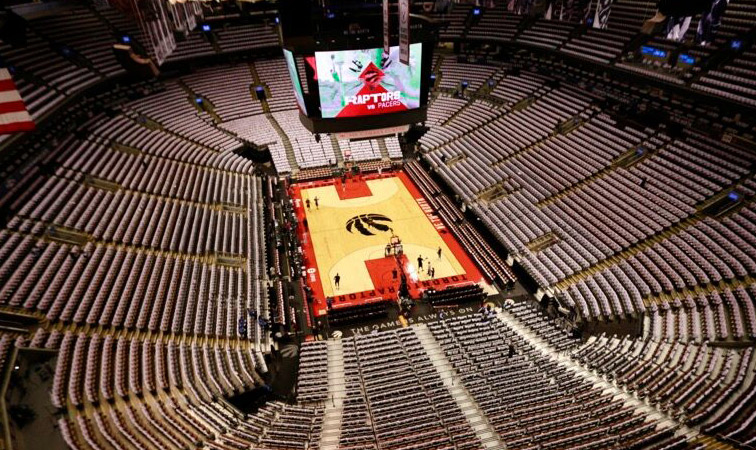Photo courtesy Canada Basketball
Canada 86, Argentina 92 | Box Score
Canada’s senior men’s national team and the Americup just don’t mix, something the program received further proof of in a gut-wrenching overtime loss to Argentina on Monday night.
Things looked bleak early on, so maybe we should have divested early. Coming off of a dispiriting loss to the U.S. Virgin Islands that essentially made the rest of the tournament a must-win for Canada, they came out fairly flat, once again struggling from the field early on. Brady Heslip hitting an early triple should have been a nice sign, but that bucket, which tied the game at seven, would be the last one Canada scored for four-and-a-half minutes, allowing the host Argentines to pull out to a double-digit lead in the first quarter. When the frame ended, Canada was stuck 25-16 and quite clearly reeling.
When Canada limped out to start the second quarter and fell behind 14, their tournament life was barely flickering. Even Nicolas Laprovittola can only dominate without scoring for so long, though, and Canada locked in on defense to buy their offense time to find it’s footing. Argentina scored just 12 points over the final 9:13 of the half, with Canada ever-so-slowly chipping into the lead. An Andrew Nicholson three continued the major run and brought the Canadians within a possession late in the half, and after a pair of stops, Nicholson made it a one-point game from mid-range (he had nine points and eight rebounds in the half and finished with 12-and-18 on the night). They’d even briefly take a lead before entering halftime down just 42-40.
The comeback forced Argentina to turn to a somewhat banged-up Luis Scola to start the third quarter, with the captain getting the chance to show off his top-knot/silver-fox-beard combo (pulling. it. off.) after sitting the entire first half. Unfortunately, Scola pulled up lame just over a minute into the frame and had to be removed from the game, heading directly to the locker room. (Through the very rough Spanish that I know, it appears he has a possible calf tear in the leg that was not already injured.)
https://twitter.com/IsolationNBA/status/902313771628146688
Any momentum Canada had built petered out as the two sides settled into a nice back-and-forth from there, trading leads without the gap extending beyond four points the rest of the quarter. Murphy Burnatowski picked up a pair of quick fouls that brought Nicholson back in, and he promptly turned away a shot, grabbed a rebound shortly after, and kick-started a drive that ended in a go-ahead jumper for Heslip. Heslip and Nicholson both then shot free throws, nudging Canada to a 55-53 lead heading into the fourth.
Head coach Roy Rana opted to roll with his starters for the early part of the fourth (with Olivier Hanlan in Joel Anthony’s place), and the lead continued to nudge larger with four from that group in double-figures. Hanlan even pushed the lead to a game-high nine following another Nicholson block, sending Argentina into catch-up mode with six minutes to go. An awry outlet for Canada gave Argentina momentarily life, but Junior Cadougan responded with a huge and-one to give them their first double-digit lead. The home crowd got behind Argentina as they cut the lead to six, and a Grandy Glaze response could only stem the tide briefly, with the gap trimming to just four with two minutes to play.
The ship did not get righted from there. A miscommunication on offense led to a Canadian turnover, allowing Facundo Campazzo to draw the Argentines within a possession at the free-throw line. Heslip hit a pair of free throws back the other way, but Dyshawn Pierre fouled Patricio Garino on a made basket, Argentina got the offensive rebound on the missed free throw, and then Gabriel Deck was fouled while tying the game. It was full shades of Venezuela from 2015. Heslip hit a massive three to end a 14-1 run, then drew a foul following a Deck layup. He only split the pair, though, and Canada surrendered a fairly easy game-tying layup for Javier Saez on a baseline pick-and-roll, and an inbound play with three seconds to go produced a deep Heslip step-back three that missed (after it nearly produced a five-second violation; Heslip had a game-high 24 points, by the way).
Overtime in a round-robin game in a tournament without much consequence shouldn’t be cause for exasperation, sure, but an illegal screen call on Hanlan did the trick. An up-and-down call when Nicholson was quite clearly fouled didn’t help either. Anyway, the even trading of baskets mostly continued in the extra frame. Canada lost a late lead when Nicholson was whistled for a foul on Deck during a mad scramble for a rebound, and after Pierre and Cadougan were both picked off, Campazzo hit an enormous dagger three as the shot-clock expired to go up four with 10 seconds left. Rathan-Mayes, who finished with 17 points and five assists in another solid showing, missed a quick three, and that more or less ended things.
https://twitter.com/NBAdotBR/status/902328527890120705
“It was a great game for the fans,” Rana said. “It was a classic game with tight big plays down the stretch. A lot of passion and a lot of energy played by both teams. A game we will all remember for a long time. Unfortunately for us we were on the losing side today, but I think we will only get better with the experience…You never like to lose, but I’m very proud of these guys and hopefully we can bounce back and show the same passion tomorrow.”
It’s a disappointing end after a strong comeback effort, and it essentially eliminates Canada from the tournament. They’ll play Venezuela tomorrow, but the best they can finish now is 1-2, which almost surely won’t be good enough to move on to the semi-finals – technically they could win their final game by a large enough margin that if a three-team tie results, they’d move on, but it’s a pretty flimsy hope. Given the momentum that had been built with the entire program of late, it’s a difficult conclusion for the flagship team, even if it’s an understandable one given the nature of the tournament and roster construction.
From here, the team will look to regroup ahead of World Cup qualifiers in November, when the team will be made up of NBL, G-League, and non-Euroleague international players. It’s not the easiest deck Rana and company are playing with over the next few months, but they’ll have to find a way, because World Cup qualification is an absolutely necessary next step for the entire program’s continued ascension.



